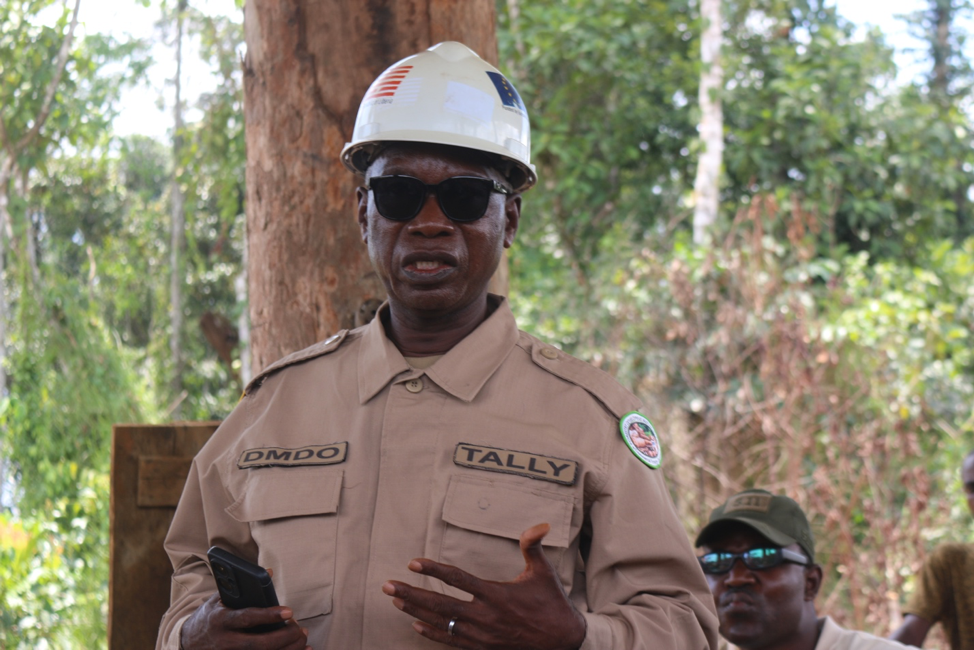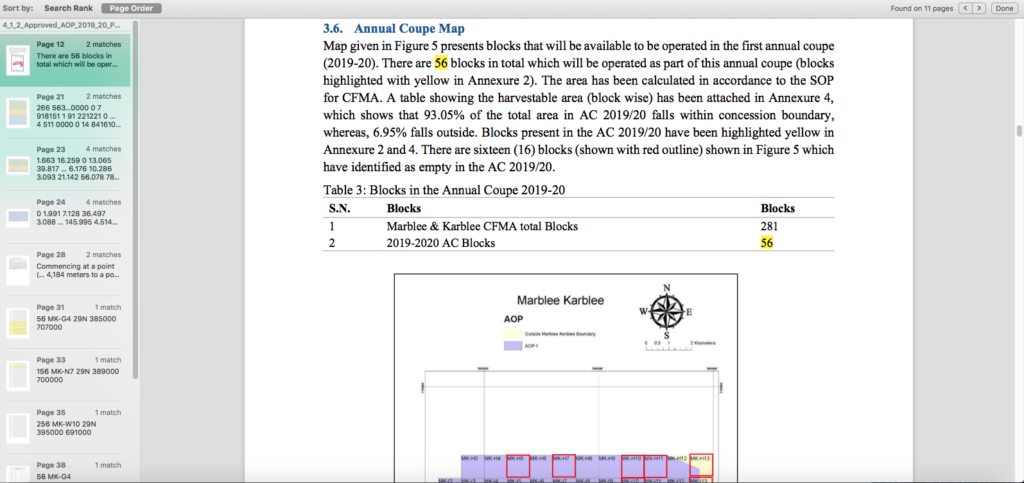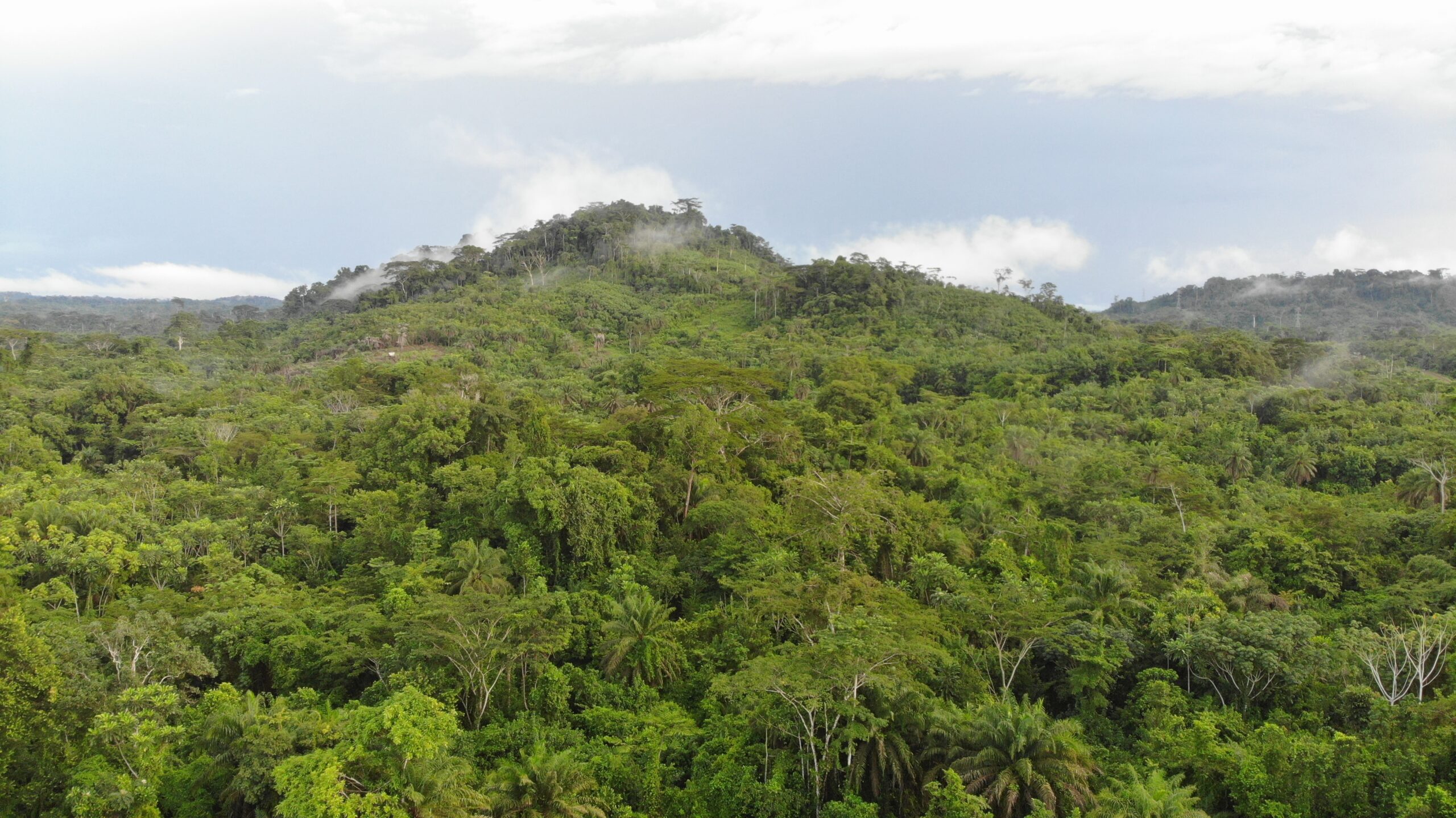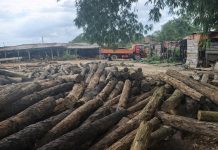Top: The Forestry Development Authority unlawfully authorized companies to harvest trees in forests in excess of the legal requirements. The DayLight/Derick Snyder
By James Harding Giahyue
- For three years, the Forestry Development Authority illegally approved community forest contracts with reduced tenures, according to official documents
- The FDA then authorized logging companies to fell trees in forest areas in excess of the legal requirements. Subsequently, the companies were to harvest up to three times more than the lawful timeframe
- At least one of the companies harvested in an extra forest area for three years before the scandal broke out
- A Ministry of Justice investigation found the FDA, its partner SGS and a company liable for at least one case
MONROVIA – From 2018 to 2020, the Forestry Development Authority unlawfully approved several contracts in community forests with reduced lifespans. Then the FDA authorized some of the contracted companies to harvest logs yearly in areas more than twice the legal sizes, according to unpublished official documents and an investigation report by the government.
In those three years, the FDA sanctioned seven logging agreements whose lifespans were sliced from 15 years to between five and 14 years, the documents show.
Thereafter, the agency permitted five companies to operate thousands of hectares of excess forestlands, breaking legal frameworks. At least one of the companies harvested in the extra area about three years before it was discovered in 2021, according to the Ministry of Justice report.
“The advent of illegality in the forestry sector has eroded the credibility of the management team, thereby affecting donors’ behavior,” Harrison Karnwea, Sr., the chairman of FDA’s board of directors, told President Weah in a letter last January.
“We have started to see the negative impacts on their support to our National Budget,” Karnwea added.
The FDA suspended and replaced four top-level managers after the ministry’s inquest, including Jerry Yonmah, the former technical manager of the commercial department. Yonmah denied any wrongdoing.
FDA board of directors asked President Weah to dismiss Yonmah, the other managers and Deputy Managing Director for Operations Joseph Tally— particularly for Gheegbarn #1. It also asked for the retirement of Tally, who had served the agency for over 30 years at the time. Yonmah had denied any wrongdoing.

But none of the dismissals happened. Yonmah and the other managers were transferred to new departments, while Tally retains his position. Tally dubbed the matter “water under the bridge” in an emailed statement to The DayLight on Wednesday and said he had a “creditable reputation.”
The scandal was similar to one in Bluyeama, where the FDA sanctioned a company to harvest trees outside its contract area valued at an estimated US$2.2 million.
Illegal Contracts
An agreement between Kparblee Community Forest in Nimba and Sanabel Investment Incorporated was reduced to 14 years. The same happened with Korninga B in Gbarpolu and Indo Africa Plantation Liberia Limited.
Another between Gheegbam #1 and the West African Forest Development Incorporated in Grand Bassa was shortened to seven years.
The FDA also sliced four other agreements to five years. They include Marblee & Karblee and African Wood & Lumber Company, Tarsue and West African Forest Development Inc in Grand Bassa. The Gbarsaw & Dorbor and African Wood & Lumber, Ziadue & Teekpeh and Brilliant Maju agreements in River Cess complete the quadruplet.
The reductions go against the Community Rights Law of 2009 with Respect to Forest Lands and the Community Rights Regulation. The legal frameworks restrict community-forest contracts to 15 years, subject to a review every five years.
The frameworks are key pillars of Liberia’s agenda to share the benefits of forest resources with locals following decades of deprivation.
Leaders of the community forests affected scandal distanced themselves from the illegality of their contracts.
Abraham Cooper of Marblee and Karblee said last year, “We did not sign any agreement behind the government of Liberia.”
Forest Bonanza
While the FDA cut the lifespans of the seven unlawful contracts, it authorized the companies to cut trees at faster rates to match the legal 15-year period. In one case, the agency approved a company’s plan to harvest outside its contract area.

For instance, the FDA approved African Wood & Lumber Company’s harvesting plan for 5,600 hectares in the Marblee & Karblee Community Forest from 2019 to 2020. It had authorized the company to cut trees on 28,000 hectares for all five years of the operations, according to one of the documents.
That means the FDA endorsed the company to harvest 3,645 hectares of forest in addition to the 24,355 hectares of the community forest. The FDA even authorized African Wood & Lumber to cut trees outside the community forest. Nearly seven percent of the area crosses over to territories belonging to adjacent towns and villages, one document shows.
“After thorough review… by the joint team…, we hereby approve said plan, having met all basic requirements,” Doryen wrote African Wood CEO Cesare Colombo, approving its plan for the 2019-2020 harvest season.
Doryen wrongly claimed in the letter that the plan contained accurate, complete and quality information. He incorrectly referenced the Guideline for Forest Management Planning and the Regulation on Pre-felling Requirements.
By law, African Wood & Lumber should have gotten 1,600 hectares per year, according to the guidelines and regulations Doryen cited. (It was unclear whether the company actually harvested in the extra area or outside the forest.)
Cesare Colombo, African Wood & Lumber owner and CEO, did not respond to emailed queries for comments.

The height of the scandal was the West Africa Forest Development Incorporated (WAFDI). The company actually harvested logs in the extra forest area the FDA approved in 2018.
In late 2021, the Ministry of Justice uncovered that the company had been operating on an illegal harvesting plan. Ironically, the FDA and WAFDI had disagreed over the export of logs from the very illegal area the regulator had approved.
But by then, WAFDI had exported some 29,104 cubic meters of round logs from 2019 to 2021, according to the Liberia Extractive Industries Transparency Initiative (LEITI). In 2021 alone, WAFDI sold US$531,460 million LEITI records show, citing FDA and company figures.
The ministry reprimanded FDA, WAFDI and SGS, a Switzerland-based firm that created Liberia’s log-tracking system, for the violations.
Minister of Justice Musa Dean said in a letter to Karnwea that Doryen approved WAFDI’s plan “although such management plan violated… the National Forestry Reform Law… and the Code of Harvesting Practices…
“FDA was in gross violation of the law in failing to ensure that the approved management plan reflected the portion of the forest area that could be harvested within seven years… and not allow blanket harvesting of the entire area for five years,” Dean’s letter read.
FDA’s board of directors urged Managing Director Mike Doryen, who approved all the illegal contracts and harvesting plans, to sign future documents with the advice of the FDA’s legal department.
The board also suggested that Doryen attended sector meetings to abreast himself with governance and operational matters. Doryen still skips those meetings, according to two regular attendees of the regular gatherings. At an international climate and forest conference Liberia hosted earlier this year, he had promised to attend the meetings. Doryen did not return a thread of emails we sent to him between last February and this month.
WAFDI called off an interview in its third minute with The DayLight at the company’s camp in Compound Number Two. A company executive said The DayLight did not inform them about the interview beforehand.
Abandoned Agreements
All of the other companies involved in the scandal have deserted their responsibilities to the government and the communities.
African Wood & Lumber has not worked in Marblee & Karblee in the last three years. It abandoned some 2,682 logs in Marblee & Karblee. And it owes the company an estimated US$126,029 community in land rental and harvesting fees.
Indo Africa has abandoned Korninga B, which had filed for cancellation of the deal following years of stalemate.
WAFDI no longer works in Tarsue, which did not have the right to sign an agreement when logging began there. Locals had considered terminating the contract.
African Wood walked out of the agreement with Gbarsaw & Dorbor, where it illegally harvested 550 logs in December 2020.

Similarly, Brilliant Maju has not been active for years, according to local media and a union of authorized community forests. The company has failed to fulfill its side of the agreement with Ziadue & Teekpeh.
Sanabel abandoned 710 logs in Kparblee, and owes the Nimba community in land and harvesting fees, according to villagers.
“The agreements are dormant,” said Bonathan Walaka, the lead facilitator of the National Union of Community Forest Management Body. “They are all dormant.”
This story was a production of the Community of Forest and Environmental Journalists of Liberia (CoFEJ).





Facebook Comments